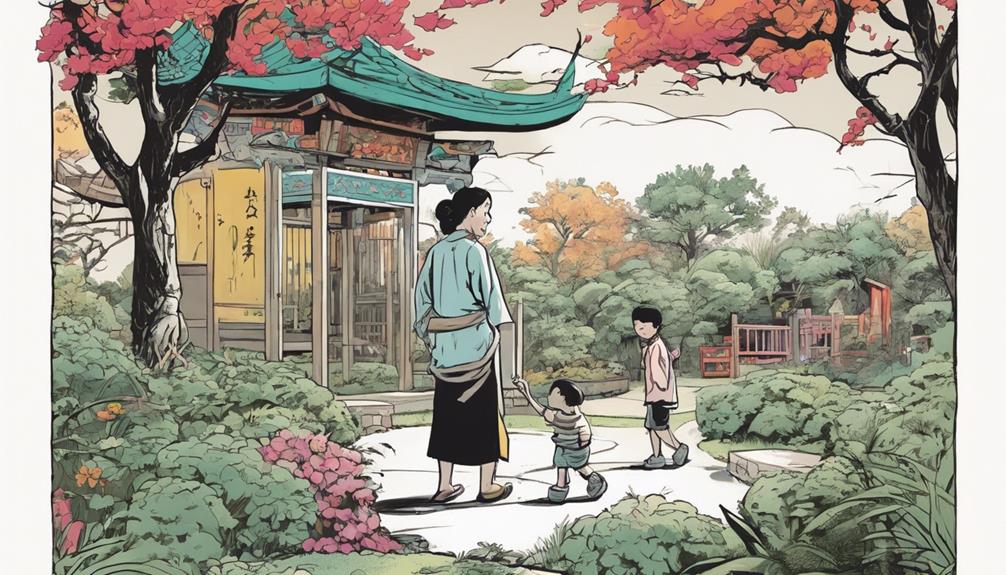Eastern and Western parenting styles offer unique perspectives because of distinct cultural values. Asian families often stress on **discipline**, **respect**, and **academic success**. Western folks, however, focus on **emotional growth**, **independence**, and **individuality**. These stems sprout from **Confucianism** in the East and **individualism** in the West. Western techniques feel cozier, while Asian approaches might come across as tougher. These differences matter since they can spark tussles between traditional Asian and modern Western beliefs. By exploring these values, readers can uncover the fascinating distinctions and grasp the varied landscapes of parenting across cultures.
Key Takeaways
• Eastern parenting emphasizes respect, obedience, and academic achievement, whereas Western parenting values emotional development and self-esteem.
• Asian parenting tends to be more authoritarian, focusing on discipline and respect, while Western parenting is more democratic, emphasizing autonomy and individuality.
• Family honor and respect for authority are deeply ingrained in Asian cultures, shaping parenting approaches and values.
• Cultural exchange programs can foster understanding and bridge the gap between Eastern and Western parenting styles, promoting a more informed approach to raising children.
• Parenting styles vary greatly between East and West, with conflicting views on discipline, autonomy, and family values, highlighting the importance of cultural understanding.

Top of the Class: How Asian Parents Raise High Achievers–and How You Can Too
As an affiliate, we earn on qualifying purchases.
As an affiliate, we earn on qualifying purchases.
Cultural Roots of Parenting Styles
As you explore the world of parenting, you'll discover that the roots of Eastern and Western parenting styles are deeply embedded in their respective cultural philosophies, with Eastern parenting drawing heavily from Confucianism and Western parenting rooted in the values of individualism and autonomy.
The Asian parenting style, guided by Confucian principles, emphasizes respect for authority, obedience, and academic achievement. This authoritarian approach prioritizes family honor and harmony, with parents expecting children to conform to traditional values.
In contrast, Western parenting values individualism, encouraging children to express themselves and make independent decisions. This autonomy-focused approach prioritizes emotional development and self-esteem, with parents encouraging children to explore their own interests and desires.
The cultural differences between Eastern and Western parenting styles are striking, reflecting fundamentally different values and expectations. By understanding the cultural roots of these parenting styles, you'll gain insight into the diverse approaches to child-rearing that shape the lives of children worldwide.

52 Essential Social Situations – Social Skills Activities for Kids (3-6th Grade) – Social Emotional Learning & Growth Mindset for Family, Classroom, Counseling – Conversation Card Games for Kids 8-12
Winner, Brain Child Award: Teach social skills and communication; help kids and tweens understand expectations, social blunders, manage…
As an affiliate, we earn on qualifying purchases.
As an affiliate, we earn on qualifying purchases.
Raising Children in Harmony

You'll likely find that raising children in harmony depends on striking a balance between discipline and nurturing, with Asian parents often erring on the side of discipline and Western parents leaning towards nurturing. This balance is vital in fostering a harmonious environment for children to grow and thrive. Asian parenting, which emphasizes obedience and respect, can sometimes be seen as authoritarian, while Western parenting, which values independence and individuality, tends to be more democratic.
| Cultural Values | Parenting Style | Priorities |
|---|---|---|
| Asian | Authoritarian | Family honor, obedience |
| Western | Democratic | Independence, self-expression |
| Both | Balanced | Harmony, nurturing |
Understanding the differences in parenting styles between East and West is essential for harmonious child-rearing practices. By recognizing the influence of cultural values on parenting approaches, you can adapt your approach to meet the unique needs of your child. By striking a balance between discipline and nurturing, you can create a harmonious environment that fosters growth, respect, and independence.

Raising Antiracist Children: A Practical Parenting Guide
As an affiliate, we earn on qualifying purchases.
As an affiliate, we earn on qualifying purchases.
Parenting Philosophies Compared

When examining parenting philosophies, a striking contrast emerges between Eastern and Western approaches, with the former prioritizing academic achievement and respectful behavior, and the latter emphasizing autonomy and emotional development.
You might be surprised to learn that Asian parenting, often associated with the Tiger Mom concept, typically adopts an authoritarian parenting style, where obedience and academic excellence are paramount. In contrast, Western parenting values individuality and independence, focusing on emotional development and autonomy.
This disparity stems from cultural values, with Eastern parents often relying on traditional wisdom and Western parents seeking guidance from communities and educators.
As you navigate the complexities of child-rearing, it's crucial to recognize these fundamental differences. By understanding the underlying philosophies, you can adopt a parenting style that aligns with your cultural background, ensuring effective child development.
In today's world, cultural exchange around parenting is vital, and recognizing these disparities can foster a deeper appreciation for diverse child-rearing styles.

Parenting Without Borders: Surprising Lessons Parents Around the World Can Teach Us
As an affiliate, we earn on qualifying purchases.
As an affiliate, we earn on qualifying purchases.
Values Shaping Child Development

As you explore the values shaping child development in Asian and Western parenting, you'll notice that family honor matters greatly in Eastern cultures, where respect for authority is deeply ingrained.
In contrast, Western parenting tends to prioritize individual autonomy and self-expression, often leading to differing outcomes in children's self-esteem and social skills.
Family Honor Matters
In Asian cultures, the concept of family honor serves as a guiding principle that shapes child development, influencing parenting decisions and values instilled in children from a young age. As a parent, you're likely to prioritize harmony and family cohesion over individuality and independence.
You'll emphasize values like respect, obedience, and filial piety, teaching your child the importance of respecting authority figures and upholding family reputation. This focus on collective well-being means you'll often put the needs of the family ahead of personal desires.
Saving face and avoiding shame are important, as they directly impact family honor. By instilling traditional values and cultural pride, you're ensuring your child understands their role in maintaining the family's good name. In Asian parenting, this emphasis on family honor matters, and it's crucial to recognize how it shapes your parenting approach.
Respect for Authority
You teach your child to respect authority figures, a value deeply ingrained in Asian parenting, by modeling obedience and deference to those in positions of power.
In Asian cultures, respect for authority is a cornerstone of traditional values, where children are taught to prioritize obedience and discipline. This emphasis on hierarchy is reflected in the way children are encouraged to follow instructions without questioning, as a sign of respect and good behavior.
By instilling discipline through adherence to authority figures, Asian parents aim to cultivate a sense of honor and duty in their children. This approach is rooted in the understanding that respect for authority is essential for maintaining social harmony and order.
In Asian parenting, authority figures, such as parents and teachers, are seen as repositories of wisdom and knowledge, and children are taught to value their guidance and direction. By adopting this approach, Asian parents seek to raise children who are respectful, obedient, and dutiful, with a strong sense of responsibility and accountability.
Bridging the Cultural Divide

As you explore the concept of bridging the cultural divide in parenting, you'll find that cultural exchange programs can be a valuable tool in fostering understanding between Eastern and Western parenting approaches.
By immersing yourself in different cultural environments, you can gain a deeper appreciation for the values that shape parenting styles in various societies.
Cultural Exchange Programs
Through cultural exchange programs, parents can tap into a wealth of knowledge, gaining valuable insights into diverse parenting approaches and refining their own methods by incorporating effective strategies from both Asian and Western cultures.
These programs facilitate the sharing of parenting practices between Eastern and Western cultures, aiming to bridge the cultural divide and promote mutual understanding of different parenting styles.
By participating in cultural exchange programs, you'll have opportunities to learn about and adapt elements of both Asian and Western parenting approaches, gaining a deeper understanding of the similarities and differences between them.
You'll be encouraged to engage in dialogue and collaboration, adopting effective parenting strategies from diverse cultural perspectives. By doing so, you'll gain insights into alternative parenting methods and be able to incorporate them into your own practices.
This exchange of ideas won't only broaden your perspective but also equip you with the knowledge to make informed decisions about your own parenting style.
Understanding Different Values
Cultural nuances and deeply ingrained values shape the contrasting parenting styles of Asian and Western cultures, resulting in differing expectations and approaches to raising children. As you explore the world of parenting, it's important to understand the diverse child-rearing beliefs and values that govern Asian and Western parenting styles.
Asian parenting values obedience and respect, prioritizing family honor and harmony, whereas Western parenting values independence and individuality, emphasizing self-expression and autonomy.
Cultural differences greatly influence disciplinary approaches and expectations, leading to generational conflicts between traditional Asian parenting values and modern Western parenting norms.
Understanding these differences is vital for bridging the cultural divide between Asian and Western parenting styles, allowing for a more inclusive and effective approach to raising children.
Navigating Differences in Parenting

When exploring the differences between Eastern and Western parenting styles, you'll likely encounter conflicting views on discipline, autonomy, and family values that require careful consideration. As you navigate these differences, it's crucial to understand the cultural values that underpin each approach.
Eastern parenting, for instance, often emphasizes obedience and respect, while Western parents tend to focus on autonomy and individuality. This contrast is particularly evident in disciplinary methods, where authoritarian parents in Asian families may prioritize respect for authority, while Western parents adopt a more democratic approach.
The importance of education is another area where East meets West, with Asian parents placing great emphasis on academic achievement. Understanding these differences in parenting styles can be challenging, but grasping the underlying values and approaches can lead to a more holistic perspective on effective child-rearing practices.
Frequently Asked Questions
What Is the Difference Between Asian and Western Parenting Styles?
You'll notice that Asian and Western parenting styles differ considerably. Asian parents tend to be more authoritarian, emphasizing obedience and respect, while Western parents focus on fostering independence and individuality.
Asian parents prioritize academic excellence, whereas Western parents value emotional development and autonomy in children. These distinct approaches are shaped by cultural influences, resulting in differing values and goals for child-rearing.
What Is the Difference Between Western and Eastern Parenting?
You might think that Western and Eastern parenting styles are just two sides of the same coin, but that's not entirely true.
While both aim to raise capable kids, they differ in their priorities. Western parents focus on fostering independence, emotional intelligence, and self-expression, whereas Eastern parents emphasize academic achievement, respect for authority, and social harmony.
What Is the Parenting Style in the Eastern Countries?
As you explore Eastern parenting styles, you'll notice a strong emphasis on authority and obedience. Parents in these cultures, such as China, prioritize education and family values, reflecting the influence of Confucian philosophy.
You'll find high expectations for academic excellence, with discipline often involving corporal punishment. Family bonds and community ties are also paramount, shaping the traditional, authoritarian approach that defines parenting in Eastern countries.
How Is Eastern Family Different From Western Family?
You'll notice that Eastern families differ from Western ones in several key ways. For instance, Eastern families prioritize family honor and harmony, whereas Western families emphasize self-expression and individuality.
Additionally, Eastern parents often adopt an authoritarian style, whereas Western parents tend towards a more democratic approach. These fundamental differences in values, discipline methods, and communication styles shape the distinct dynamics of Eastern and Western families.
What are the major differences between Asian parenting and Western parenting?
When it comes to asian vs western parenting style, one major difference is the approach to independence. Asian parents tend to focus on respect for elders and obedience, while western parents often encourage individuality and autonomy. This can lead to differences in expectations for children’s behavior and decision-making.
Conclusion
As you reflect on the differences between Asian and Western parenting styles, consider this striking statistic: in 2014, 61% of South Korean students reported feeling 'very stressed' about their academic performance, compared to 22% of American students (OECD, 2014).
This disparity underscores the vastly different cultural priorities shaping child development. By acknowledging these differences, we can work towards a greater understanding and appreciation of diverse parenting approaches, ultimately enriching our own parenting philosophies.










